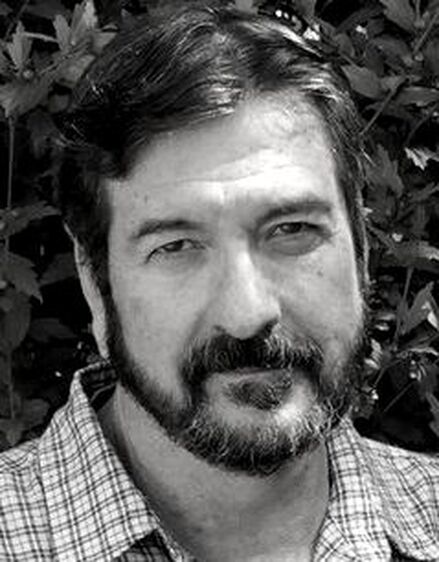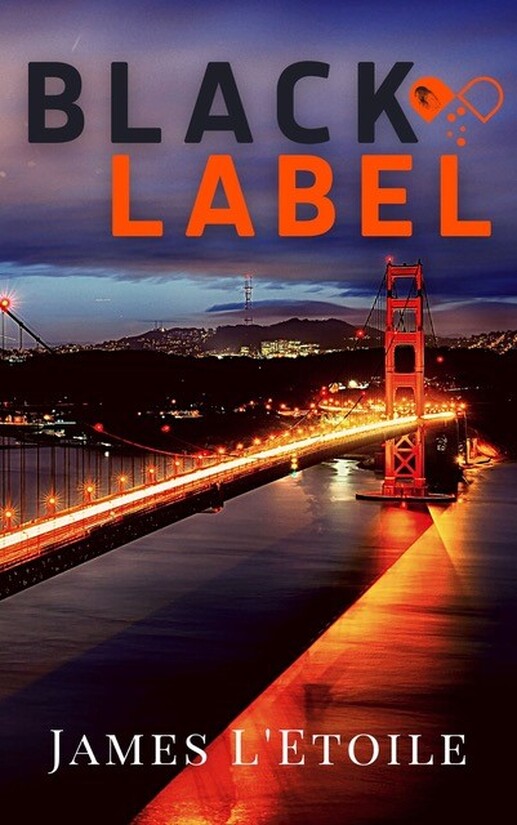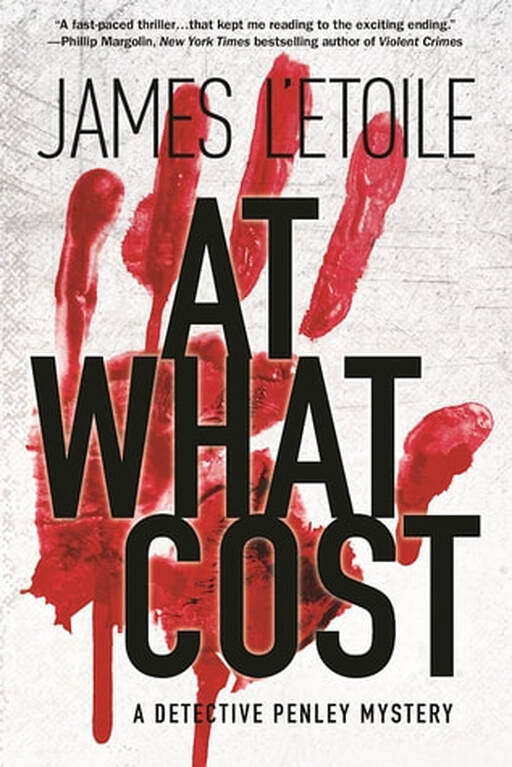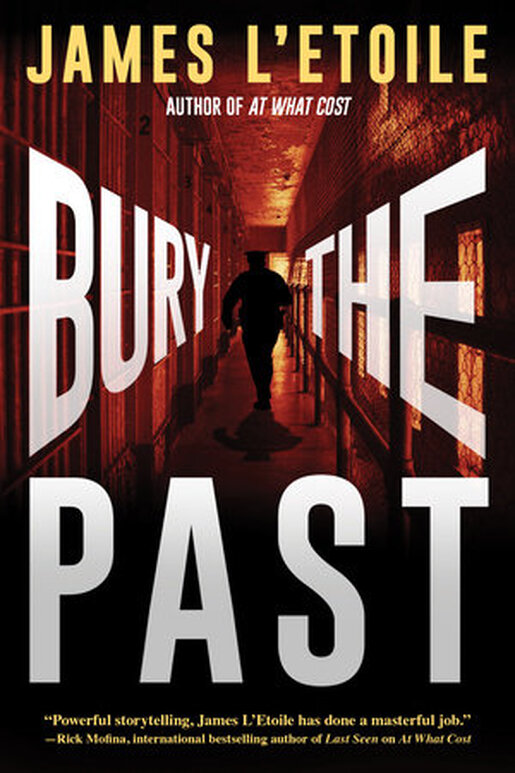
It gives me great pleasure to welcome James L'Etoile onto the website today. James has written four novels and has been nominated for the Silver Falchion for Best Procedural Mystery, and The Bill Crider Award for short fiction.
Alex: Tell me a bit about yourself, James.
James: My background is a bit different than most. I grew up in prison. No, I mean it. My father was a correctional lieutenant and as a child, we lived on prison grounds. One of the prison camps was quite remote and my “playmate” was the inmate gardener. He’d wheel me about in the wheelbarrow as he went about his rounds. I was able to wander through the prison dorms and had my hair cut by the prison barber. I had the chance to get to know many of the men who came to the prison without knowing why they ended up there.
In spite of this background, or perhaps because of it, I ended up working in California’s prison system for twenty-nine years. I served as a facility captain, hostage negotiator, an associate warden in a maximum-security prison, and retired as the director of California’s parole system.
I didn’t begin writing until after I retired. I lacked the confidence to jump in and write fiction, until I thought back to one of my early assignments as a probation officer. I prepared pre-sentence reports for the sentencing judge. To prepare those reports, I interviewed the defendant in jail, taking down their version of the crime, spoke with the investigators, read the arrest reports, and met with victims uncovering the impact of the crime on them, or their families. I’d then have to sort through all this information and cobble together a narrative about the crime and make a recommendation for how long in prison or jail it deserved. What I didn’t realize until I thought about writing crime fiction was, I’d been writing crime stories all along.
With that confidence—that I’d been down this road before—I began learning more about the craft of fiction writing, attending writer’s conferences like the Book Passage Mystery Writers Conference outside of San Francisco.
Alex: Tell me a bit about yourself, James.
James: My background is a bit different than most. I grew up in prison. No, I mean it. My father was a correctional lieutenant and as a child, we lived on prison grounds. One of the prison camps was quite remote and my “playmate” was the inmate gardener. He’d wheel me about in the wheelbarrow as he went about his rounds. I was able to wander through the prison dorms and had my hair cut by the prison barber. I had the chance to get to know many of the men who came to the prison without knowing why they ended up there.
In spite of this background, or perhaps because of it, I ended up working in California’s prison system for twenty-nine years. I served as a facility captain, hostage negotiator, an associate warden in a maximum-security prison, and retired as the director of California’s parole system.
I didn’t begin writing until after I retired. I lacked the confidence to jump in and write fiction, until I thought back to one of my early assignments as a probation officer. I prepared pre-sentence reports for the sentencing judge. To prepare those reports, I interviewed the defendant in jail, taking down their version of the crime, spoke with the investigators, read the arrest reports, and met with victims uncovering the impact of the crime on them, or their families. I’d then have to sort through all this information and cobble together a narrative about the crime and make a recommendation for how long in prison or jail it deserved. What I didn’t realize until I thought about writing crime fiction was, I’d been writing crime stories all along.
With that confidence—that I’d been down this road before—I began learning more about the craft of fiction writing, attending writer’s conferences like the Book Passage Mystery Writers Conference outside of San Francisco.

Alex: How would you describe your writing, and are there particular themes that you like to explore?
James: I write thrillers and procedurals. These stories tend to expose humanity at its worst moments where bad things happen to good people. But within the framework of crime fiction, I explore current social issues such as human trafficking, immigration policy, and counterfeit pharmaceuticals.
Alex: Are you a writer that plans a detailed synopsis or do you set out with a vague idea and let the story unfold as you write?
James: I’m not one of those writers who jump right in and lets the story unfold. I’m not one who writes a hundred-forty-page outline like Jeffery Deaver, either. I have a small kernel of a story; something like a pharmaceutical representative uncovers an off the books counterfeit lab in the company. Then I flesh out the characters—before I write the story. Character first means I want to know everything I can about the “people” I’m going to live with for the next several months. I jot down a character description, find out what motivates them, what they fear, and their quirks. I’ve gone as far as writing a short story in that character’s voice to get an idea of their dialogue and interaction with other characters in the planned novel. Character is important and I think we’ve all experienced a book, or movie where the plot was so-so, but we hung in there and finished it because we wanted to know what happened to the characters. We started to care about them.
Alex: Tell us about your latest novel.
James: The inspiration for Black Label came from a session I was teaching at the Book Passage Mystery Writers Conference a couple of years back. A few of us were talking about using fear in our work. Not the fear that you won’t hit your deadline, or the fear that no one will read your book, both real, but I’m talking about that base-level fear each of us have at one point or another. Fear of heights, fear of the dark, or in my case fear of being utterly helpless.
There’s something about being helpless that scares the bejesus out of me. Maybe it’s the control-freak in me, or it could stem from working in prison where you always had to be in control and be prepared for the bottom to drop out from you at any second. So, I wanted to create a character and a storyline where that kind of fear was thrust upon them. What could make someone feel helpless more than being accused of a murder when you’re not sure if you did it or not?
In Black Label, Jillian Cooper is faced with evidence that she’s either a murderer or insane. I like the idea that she must struggle through the helplessness, when the police, the press, the corporate boardroom, and her own mind are ready to take her down.
Jillian is like so many of us who devote our lives to the company, even take on the job as part of her identity. Jillian is smart, focused, and driven to succeed. Her Type-A personality is probably in response to her childhood experiences—told she never measured up to her older sibling, witnessing her mother’s declining mental health and eventual suicide. These all combined to push Jillian to excel and prove to herself that she was good enough.
I think Jillian would tell readers that she is a cautionary tale. When you are so single-focused, spending all your waking moments emptying your life into a job, you miss what’s happening all around you. Sometimes that means you sacrifice relationships, or social interaction. In Jillian’s case it threatens to kill her. I think Jillian would now advocate for a work-life balance.
James: I write thrillers and procedurals. These stories tend to expose humanity at its worst moments where bad things happen to good people. But within the framework of crime fiction, I explore current social issues such as human trafficking, immigration policy, and counterfeit pharmaceuticals.
Alex: Are you a writer that plans a detailed synopsis or do you set out with a vague idea and let the story unfold as you write?
James: I’m not one of those writers who jump right in and lets the story unfold. I’m not one who writes a hundred-forty-page outline like Jeffery Deaver, either. I have a small kernel of a story; something like a pharmaceutical representative uncovers an off the books counterfeit lab in the company. Then I flesh out the characters—before I write the story. Character first means I want to know everything I can about the “people” I’m going to live with for the next several months. I jot down a character description, find out what motivates them, what they fear, and their quirks. I’ve gone as far as writing a short story in that character’s voice to get an idea of their dialogue and interaction with other characters in the planned novel. Character is important and I think we’ve all experienced a book, or movie where the plot was so-so, but we hung in there and finished it because we wanted to know what happened to the characters. We started to care about them.
Alex: Tell us about your latest novel.
James: The inspiration for Black Label came from a session I was teaching at the Book Passage Mystery Writers Conference a couple of years back. A few of us were talking about using fear in our work. Not the fear that you won’t hit your deadline, or the fear that no one will read your book, both real, but I’m talking about that base-level fear each of us have at one point or another. Fear of heights, fear of the dark, or in my case fear of being utterly helpless.
There’s something about being helpless that scares the bejesus out of me. Maybe it’s the control-freak in me, or it could stem from working in prison where you always had to be in control and be prepared for the bottom to drop out from you at any second. So, I wanted to create a character and a storyline where that kind of fear was thrust upon them. What could make someone feel helpless more than being accused of a murder when you’re not sure if you did it or not?
In Black Label, Jillian Cooper is faced with evidence that she’s either a murderer or insane. I like the idea that she must struggle through the helplessness, when the police, the press, the corporate boardroom, and her own mind are ready to take her down.
Jillian is like so many of us who devote our lives to the company, even take on the job as part of her identity. Jillian is smart, focused, and driven to succeed. Her Type-A personality is probably in response to her childhood experiences—told she never measured up to her older sibling, witnessing her mother’s declining mental health and eventual suicide. These all combined to push Jillian to excel and prove to herself that she was good enough.
I think Jillian would tell readers that she is a cautionary tale. When you are so single-focused, spending all your waking moments emptying your life into a job, you miss what’s happening all around you. Sometimes that means you sacrifice relationships, or social interaction. In Jillian’s case it threatens to kill her. I think Jillian would now advocate for a work-life balance.

Alex: What was the first book you read?
James: I was a huge science fiction and classic horror geek as a kid. Asimov, Clarke, Bradbury, Orwell—I ate them up. But it wasn’t until I read Bram Stoker’s Dracula that I found out what it was to be pulled into a story. I recall being so into the passage I was reading that I nearly jumped out of my skin when the school bell rang.
Alex: How much research do you do and what does it usually entail?
James: I’m fortunate in being able to draw on my prison and parole experience to help flesh out characters. I do research when I’m unfamiliar with the subject as was the case in At What Cost where a detective is hunting a serial killer who seems to be harvesting his victim’s organs. I found a surgeon who was more than willing to tell me about his residency in transplant surgery while he was working on my shoulder.
Alex: Do you ever base your characters on people you have encountered in real life?
James: I’ve found the antagonists in my books draw from the murderers, psychopaths, and gang members I worked with over the years. You witness a lot of violence in prison and writing about it has proven rather therapeutic.
James: I was a huge science fiction and classic horror geek as a kid. Asimov, Clarke, Bradbury, Orwell—I ate them up. But it wasn’t until I read Bram Stoker’s Dracula that I found out what it was to be pulled into a story. I recall being so into the passage I was reading that I nearly jumped out of my skin when the school bell rang.
Alex: How much research do you do and what does it usually entail?
James: I’m fortunate in being able to draw on my prison and parole experience to help flesh out characters. I do research when I’m unfamiliar with the subject as was the case in At What Cost where a detective is hunting a serial killer who seems to be harvesting his victim’s organs. I found a surgeon who was more than willing to tell me about his residency in transplant surgery while he was working on my shoulder.
Alex: Do you ever base your characters on people you have encountered in real life?
James: I’ve found the antagonists in my books draw from the murderers, psychopaths, and gang members I worked with over the years. You witness a lot of violence in prison and writing about it has proven rather therapeutic.

Alex: Which was the last book you read that blew you away?
James: I read constantly. One book which really made an impression was Karen Dionne’s The Marsh King’s Daughter. I don’t want to give anything away about this fantastic book other than there is good reason it’s been made into a major motion picture.
Alex: How do you market your books?
James: Marketing during the pandemic was a bit challenging. I think I’m suffering from Zoom fatigue like everyone else, but that phenomenon did allow readers to attend events they normally wouldn't have been able to see. Virtual events and blog tours are replacing the bookstore tours. I’d like to get back to some middle ground. It’s hard to beat the energy of an in-person event.
Alex: What are your interests aside from writing? And what do you do to unwind?
James: When I’m not hunched over the keyboard, I find time to recharge by dabbling in woodworking, and working with our two therapy dogs. The dogs, Emma and Bryn are Pembroke Welsh Corgis and are certified therapy dogs who visit patients in nursing homes, memory care facilities, assisted living centers, and listen to children read to them at library reading to the dogs sessions. It’s quite rewarding, for us and the dogs.
Alex: Which authors do you particularly admire and why?
James: There are so many authors in the fiction community who are amazing. Andrew Grant, Jennifer Hillier, Karen Dionne, and Hank Philippi-Ryan are not only fantastic writers, but are extremely supportive of others, especially debut authors.
Alex: James, what can I say? It's been a real treat listening to you. Your first hand experiences within the prison system are fascinating and must clearly give you the most extraordinary insights as a writer. I can't wait to read your books.
James: Thank you Alex. It's been a real pleasure.
James: I read constantly. One book which really made an impression was Karen Dionne’s The Marsh King’s Daughter. I don’t want to give anything away about this fantastic book other than there is good reason it’s been made into a major motion picture.
Alex: How do you market your books?
James: Marketing during the pandemic was a bit challenging. I think I’m suffering from Zoom fatigue like everyone else, but that phenomenon did allow readers to attend events they normally wouldn't have been able to see. Virtual events and blog tours are replacing the bookstore tours. I’d like to get back to some middle ground. It’s hard to beat the energy of an in-person event.
Alex: What are your interests aside from writing? And what do you do to unwind?
James: When I’m not hunched over the keyboard, I find time to recharge by dabbling in woodworking, and working with our two therapy dogs. The dogs, Emma and Bryn are Pembroke Welsh Corgis and are certified therapy dogs who visit patients in nursing homes, memory care facilities, assisted living centers, and listen to children read to them at library reading to the dogs sessions. It’s quite rewarding, for us and the dogs.
Alex: Which authors do you particularly admire and why?
James: There are so many authors in the fiction community who are amazing. Andrew Grant, Jennifer Hillier, Karen Dionne, and Hank Philippi-Ryan are not only fantastic writers, but are extremely supportive of others, especially debut authors.
Alex: James, what can I say? It's been a real treat listening to you. Your first hand experiences within the prison system are fascinating and must clearly give you the most extraordinary insights as a writer. I can't wait to read your books.
James: Thank you Alex. It's been a real pleasure.
